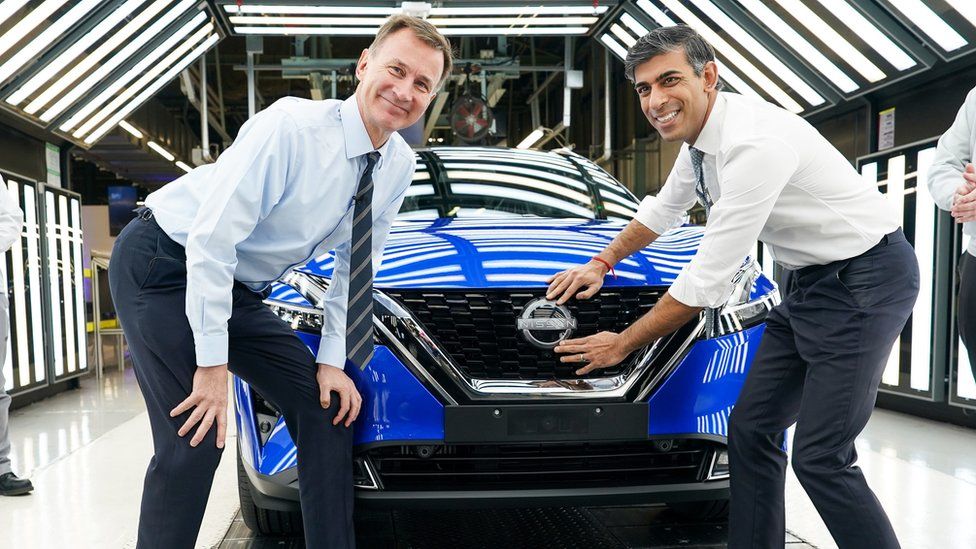Nissan: Sunderland investment 'exciting' but warning over reliance
- Published

News of a £2bn investment into Sunderland's Nissan plant has been described as a "huge vote of confidence" in the city.
But a think tank has warned against it becoming too reliant on the automotive sector.
It comes as Nissan announced plans to build three electric car models at its Sunderland factory.
The scheme could help preserve at least 6,000 jobs directly, and thousands more across the UK.
Sunderland residents talk about the impact of Nissan's announcement
It will see the firm build electric Qashqai and Juke models at the plant, alongside the next generation of the electric Leaf, which is already produced there.
A major new battery plant known as a gigafactory will also be needed, Nissan said.
Prime Minister Rishi Sunak, who visited the site on Friday, said the investment was "a massive vote of confidence in the UK's automotive industry".
"This venture will no doubt secure Sunderland's future as the UK's Silicon Valley for electric vehicle innovation and manufacturing," he added.
Ian Reeve, Look North business correspondent
Nissan always had plans to build the replacements for its diesel and petrol models of the Qashqai and the Juke in the North East.
What caused some uncertainty was the intimation from Nissan earlier in the year that those plans could be scrapped because of high energy costs.
As ever, it said it was looking to the government for cash help to ensure the investment was made.
The government has duly obliged.
And yet building the two models anywhere else would make little sense.
Sunderland gives access to the important European market.
The plant is now the only European manufacturing facility, after a Barcelona factory was repurposed.
And Sunderland already makes hybrid models of both the Qashqai and the Juke - cars that run on both petrol and battery power.
This announcement will take Nissan a stage further in its aim to make only electric vehicles by the end of the decade.
But the question 'if not built at Sunderland, where?' should still be asked.
Nissan president and CEO Makoto Uchida said the plans put the Sunderland plant at the "heart" of their "vision", driving them "towards an all-electric future for Nissan in Europe".
Adam Pennick, vice president for manufacturing at Nissan UK, said some 2,000 employees at the factory were told about the plans on Thursday night.
"Breaking the news to them, the buzz was absolutely tremendous," Mr Pennick told BBC Radio Newcastle.
Nissan employee Lily Nicholson said: "This now certifies that the jobs are secure.
"Being here only a year, and having something this exciting already, I just think, what more is there to come?"
The announcement comes as a new Investment Zone (IZ) was confirmed for north-east England.
Supported by £160m government funding, it is set to bring a range of benefits to businesses across the region, including tax incentives and upfront infrastructure investment.
'Closure of the mines'
Sunderland City Council leader Graeme Miller said it was a "great day" for the North East and added: "It is a huge vote of confidence in the city and region - and our people - that Nissan has again chosen to invest here."
John McCabe, chief executive at the North East Chamber of Commerce, said: "This transformative project will create more skilled, higher-paid jobs and safeguard hundreds of jobs in the region, and will provide a significant boost to the North East's economy."
However, Paul Swinney, director of Policy and Research at think tank Centre for Cities said Nissan's re-commitment to building in Sunderland was a "great boost", but warned against the city becoming too reliant on the automotive industry.
"Sunderland needs more than one engine of growth if, should Nissan ever decide to leave, its departure doesn't have the same impact that the closure of the mines and shipyards had," Mr Swinney said.
Follow BBC Sunderland on Facebook, X (formerly Twitter), and Instagram. Send your story ideas to [email protected].
Related Topics
- Published25 September 2023
- Published23 November 2023